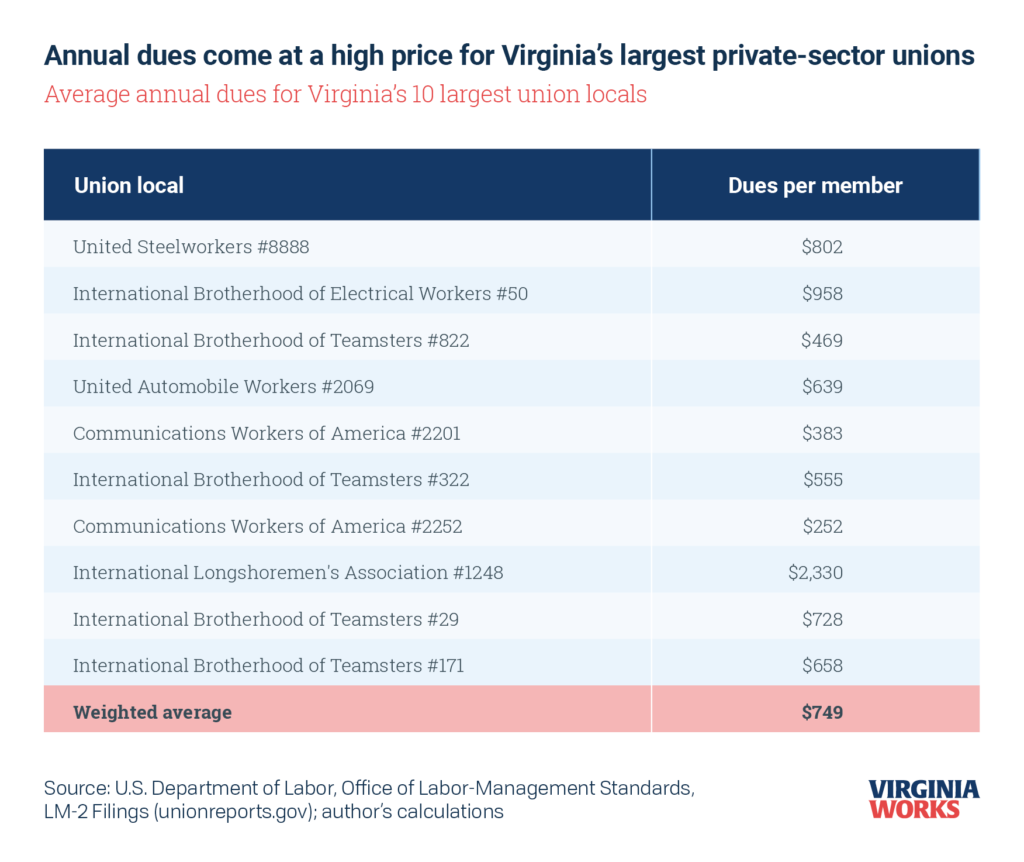How Virginia’s right-to-work repeal would cost a worker almost $44,000 in retirement savings
The costs of repealing the state’s right-to-work law are all too real for the pocketbooks of working families.
Virginia’s political leaders are attempting to repeal the commonwealth’s right-to-work law.
But if those efforts succeed, thousands of Virginians could see a pay cut, as they’re forced to pay money to a union that they currently choose not to support.
The cost is considerable. Private sector union dues average just under $750 per year in Virginia. And that cost compounds over a worker’s career, especially if she would have otherwise put that money in a retirement account. Even if workers were forced to pay just 60% of union dues, the repeal could sap an average of nearly $44,000 in potential retirement savings for the 19,000 Virginia workers in the private sector who are not currently dues-paying members of a union.
And that’s assuming dues stay flat for 30 years. Should they go up, the hit to retirement savings would be even larger.

Even without right-to-work protections, no one can be forced to join a union in Virginia
But repealing those protections would force nonmembers to pay so-called “agency” or “fair share” fees, which typically constitute a large majority of the full dues amount. If these workers paid the full cost of dues, it would send an additional $14.5 million to Virginia labor unions from workers’ paychecks.
An annual $750 outlay is a significant expense for many households. That $750 would cover more than two months’ worth of groceries for the average household.
Nationally, labor unions spent over $2 billion on politics in 2018, or about $136 per dues-paying union member. Put another way, labor unions spent almost as much on politics in 2018 (a non-presidential year) as did all major party congressional nominees combined. A significant portion of that political spending was contrary to the beliefs and convictions of many workers who funded it. And while unions are quick to point out that agency fees do not include political spending, money is fungible, and even fees may still fund activities that nonmembers do not support.
Virginians are free to join and participate in a union. That is their choice, and it is one made by nearly 100,000 private sector workers in the commonwealth.
But the decision not to join and pay dues to a union is equally a worker’s choice. Abridging that freedom undermines the rights of all Virginians. And it comes at a steep cost, both financial and political, for many Virginia workers.
Methodology
Retirement calculation assumes the average yearly dues in Virginia is $750 (rounded), meaning 60% of dues – in so-called “agency” or “fair share” fees – would be $450. If $450 is broken into monthly retirement contributions with compounded interest (using the average union pension interest rate assumption of 7%), the investment would equal $43,854.47 over 30 years. The calculation did not take into account any future increase in union dues or fees, which could increase the forfeited savings.